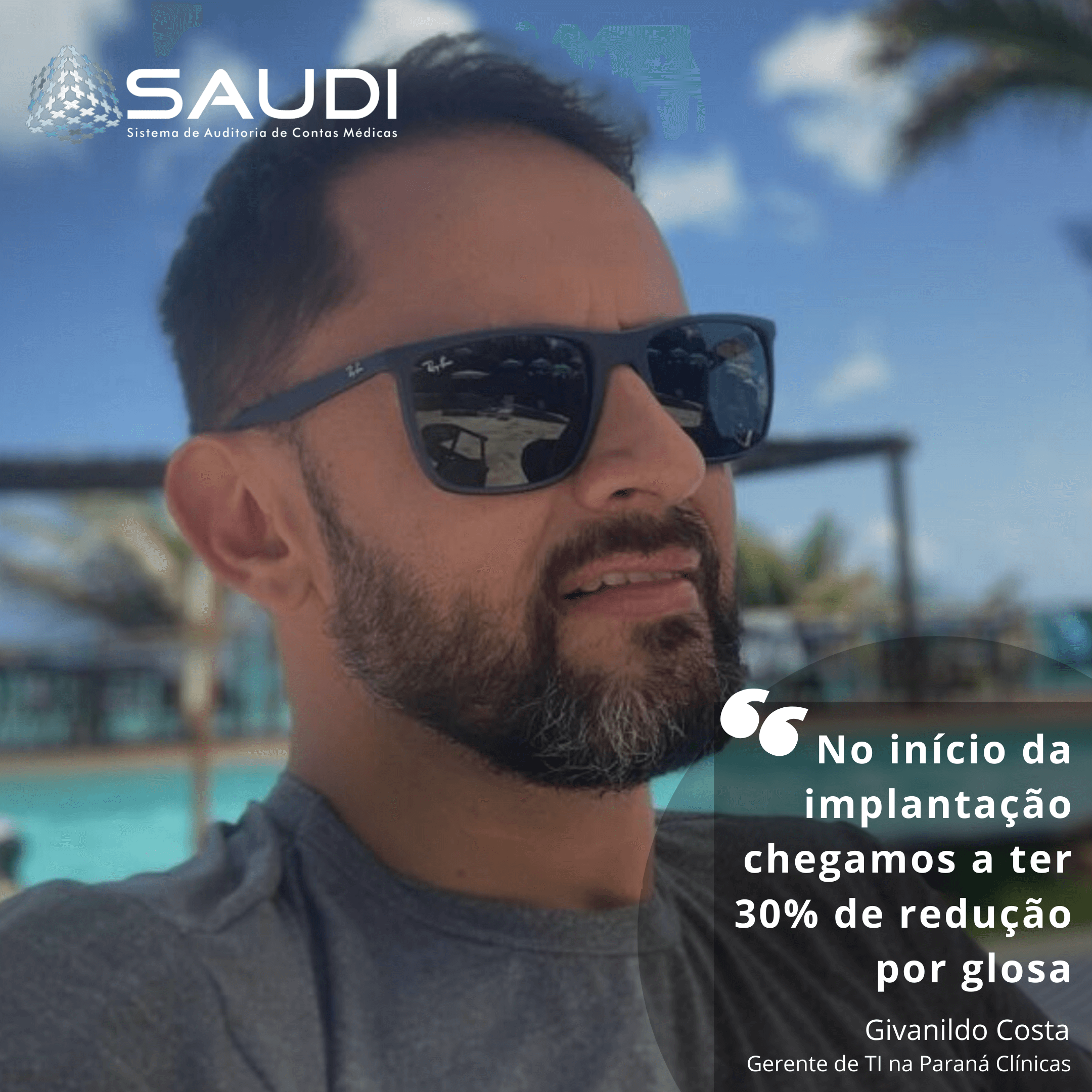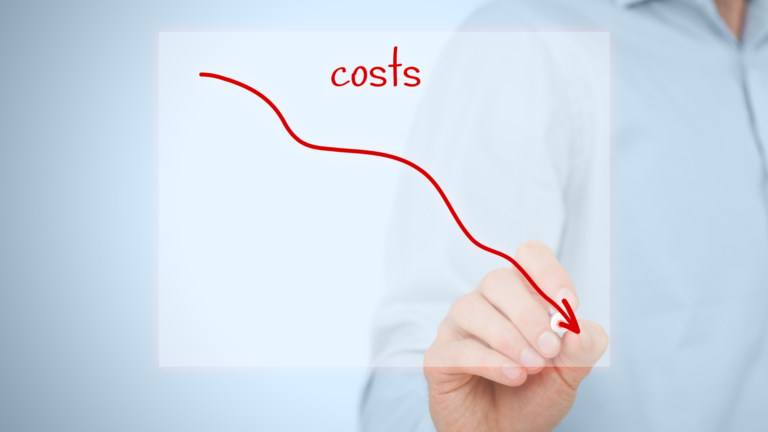GIVANILDO COSTA – IT Manager at Paraná Clinicas Saúde
With a significant trajectory of more than 20 years in the area of Information Technology, Givanildo has an Executive MBA in Health from FGV, an MBA in Concentration in Information Systems from PUC, a postgraduate degree in Management Development from FAE, a degree and technical degree in Data Processing . With experience in project management, development of new systems, IT governance, strategic planning, budget control, database administration, servers and telephony, acting with a focus on optimizing processes and service excellence.
Implementation of business strategy using BI – Business Intelligence, focusing on the breakdown of strategic objectives into performance indicators and action plans, linked or not to the BSC, cost assessment, service potential, own and accredited network, customer portfolio , CRM, health indicators and electronic medical records.
Management IT area, working on the acquisition of new assets, design of systems/services, governance, definition of IT systems and infrastructure projects, outsourced system and telephony service contracts, experience in coordination, evaluation, development, migration and integration systems, ITIL v3 service management, security policy creation and verification and restructuring of business processes.
Implementation of projects, such as: ERP – Operator and Hospital Management, Electronic Medical Record, Online Release System, Indicators, Analysis, Laboratory Automation, BI case management system focused on caring for patients with chronic diseases and preventing claims, CRM , PACS imaging system, medical protocols, QMS and ANS.
In an exclusive interview for the SAUDI Blog, Givanildo Costa talks about his professional career, how he met the SAUDI system, why he decided to use it in the audit of Paraná Clínicas' medical bills and what results were obtained in the first months of use.
1 – Tell us a summary of your professional history
I have been in the IT area, specifically in healthcare, since 1997. My career in this healthcare market began working in hospitals, implementing hospital ERP systems. I worked in the specific area of health in hospitals until the end of 1999, and my career began at Santa Cruz hospital, which is a general hospital in the Paraná Clínicas group.
In 1999 I took over management of the operator's IT area. That was when we started the movement to have our own ERP system, right at the time when Law 956/98 regulating the National Health Agency was enacted.
My trajectory goes back to that time, a little from the Law until this exact moment. I have been here at Paraná Clínica for 22 years, in the entire group, 25 years. I have 25/26 years of experience in technology in the healthcare area and in these 20 years of work we have been at the forefront of all technological innovation projects, process improvements, growth gains in scale, that is, we are this entire period here supporting the operator's growth.
We come from the 2000s, today we have twice the capacity of lives as we had at that time. We here as technology always strive for and search for technologies that would bring a competitive advantage to Paraná Clínicas, but also that would add value to our service. During these 20 years there were countless projects that we can mention here. One of them we treat as a success is our own ERP project and since then we have been improving and investing in it and it was a very good decision because today we can integrate our systems with several others and it was a fundamental point for that we implement the ACOL system, SAUDI.
2 – What was your problem before you met SAUDI?
Our audit system was very segmented, so we had a team of auditors who went to the hospitals and carried out paper audits. All this auditing was not put into the system. We didn't know if what they were auditing in the hospitals, whether or not the hospitals were charging us for this, so we had a trust problem, in knowing if the information obtained was really correct. This was a point, especially in the hospital auditing part. Here in our internal team, we were unable to, in our medical bill analysis flow, we did not have it segmented in such a way that I could identify the productivity of my technicians, my nurses, both in terms of disallowances and administrative productivity and these problems. They generated a great deal of distrust in relation to our area of medical bills, because we couldn't reach these numbers, we couldn't value the work that was done at the top by doctors, nurses, and administrative staff. We knew, of course, that there were glosses, but as these glosses were not placed in a system, there was no indicator for us to control this. We didn't know exactly what was happening on the street. That was one of the main problems.
Another problem was when audits, especially at bedsides, had nothing recorded in the system. Our intention at this point is that we could develop a platform that would allow us to integrate from authorization, control this authorization, through nursing audit, medical audit, administrative audit, account entry. We have great difficulty with payment predictability. We knew the bills were coming, but closing the medical bills was complex because we didn't know how much we actually owed on the street, how much the cost would be in that capacity. The deadlines were very long, so it took a long time to generate information for my finance team, so that they could make quick decisions on what to do if my medical bills had a higher payment volume than what was in the budget. We had some control, but it wasn't in the system and we had a lot of difficulty predicting, documenting this and recording this entire process. This was one of the countless problems we had before the SAUDI system.
3 – How did you find out about SAUDI and why did you decide to give it a vote of confidence?
I discovered the SAUDI system without having any knowledge of companies that used it. My research was basically on the internet. I went looking for some tool. Before starting research development, I deepened my research to see if I could find anyone who had already done something similar or was doing something similar. At that time I made a budget with some market companies to carry out the development, there were already some companies that sell to other operators that had some initiatives in this direction, but that did not close our entire process chain as we had imagined, from release, control , audit, pre-event, nursing, pregnancy, disallowance control, the entire process in a single system. What we found in the market was not very segmented, it did one part, it did another.
In my research I ended up finding the SAUDI system. I found it on the website, I found the approach very interesting, I asked for a remote presentation of the system for me. After that, we had several presentations, they came to Curitiba to make presentations for us. We increasingly felt that the tool was within what we imagined and was at a level of evolution consistent with what we imagined. Comparing what the market offered and what SAUDI gave us, both in the first moment and in moment zero: of implementation, there would already be good gains that we could have! Already reaping the rewards during the implementation period!
We decided on Saudi because of the competence of this system. It was noticeable that it was a simple usability system, easy to implement, that made the provider's life easier, that the provider didn't have so much difficulty, we felt in the presentations, and looking at the system itself, that it would help us a lot! We decided largely based on the competence of the system itself, but also on the SAUDI team. Their technicians who were here gave us a lot of confidence and we made the decision to form this partnership with ACOL to implement SAUDI.
4 – Tell us a little about the difficulties you had when starting to use SAUDI.
The initial difficulties in using SAUDI are those inherent in implementing a new system. As we had many providers to implement the new process, we already had a payment system ready, so we had a lot to do with the desire of our employees to transform the SAUDI system into a partner system that we had here internally. It was very difficult change management at the beginning, both in internal and external teams because people had difficulty understanding that they needed to change their process a little so that they could use the system better and by using the system processes we knew we would get more return long-term. But we managed to convince them that this was good and they saw over time that the gains we would have with the tool would actually be very good and in addition they would be able to have a unique system, to bring indicators, to better control the area from them. They realized this throughout the implementation. We had to implement and redeploy. And then we were successful in using the tool.
The difficulties were mainly those of adapting people, changing the process, understanding that the system is different and that in the long term it would bring good results for us. But we somehow managed to convince them with numbers and mainly with support from ACOL helping us in this partnership, during the implementations they spared no effort to help us.
5 – What are the results and transformation that the product has brought to your routine at the operator?
The main result was to greatly improve our disallowance and bill values, that is, being able to check mainly the materials and medicines part.
What it brought in terms of gains was the automation of these routines, the improvement of these processes, the analysis of productivity and the predictability of payment. Today, when you enter the providers' files, you already have a payment forecast. I know exactly how much I have to prepare my cash to pay off these amounts. My predictability and knowledge of what is happening in the market has become much faster for me. Knowledge of this event being carried out. This improved a lot. The management of these tables with providers, table of values, this negotiation, so today I can control this very well because I can know exactly how much that provider is charging me for a medication, how much he is trying to charge me in the files he has sending. This brought a significant gain in process improvement and reliability in the information generated from SAUDI.
But a fundamental point, I would say with great gain, is certainly the improvement of the process. But I would have no doubt in saying that the predictability of what is happening on the street, of accidents, is one of the biggest gains for us. This is fundamental. And also the use of providers became simple and easy. They managed to adapt very well, we had no difficulty. We are now at the moment of implementing the medical fee guide. For us here it is a big taboo because we have always done it in a more internal way. We are achieving good success in implementing the medical fees guide. We have been reaping some good results every month with the SAUDI system, it has helped us a lot in managing our medical bills.
6 – What happened at your operator after obtaining the results through SAUDI, that you never imagined would be possible?
Our medical department, especially the medical board, was surprised at what the providers were trying to charge us. With these new processes, they provided a lot of security both for negotiating the accreditation area and for paying bills, in other words, we have now started to look at those bills, to unveil a major problem that we had at the operator, which was this control of materials. of medicines. Now we can look at these accounts and see that we are paying what is due and what is actually contracted.
We knew that the system would provide us with this information, but it was a pleasant surprise when we started looking at the numbers and the area managers themselves can now see how much results it brings with this management of this centralized control in the SAUDI system.
7 – After implementing SAUDI, which processes became easier within your operator?
The processes that became better after the SAUDI system was the reception of XML files. So we were able to close the medical bills, we were able to bring the closing forward by more than 30 days. This was a process that helped us a lot and the SAUDI is a fundamental part of this. The process of paying medical bills has also improved a lot, because it provides greater reliability for the user and for the analyst to make payments. She has no doubts about what she is paying. The system gives her a centralized view of what was contracted and what is being charged. This has greatly speeded up our medical billing process. Our analysts are now able to really focus on the analysis of our most critical accounts, the most routine processes that SAUDI handles smoothly in its day-to-day processes.
8 – How long did it take to notice cost control and reduction after implementing SAUDI?
In the first three, four months of using the system, we were able to look at the accounts and identify the reductions and where the bottlenecks were. With the tool, we were able to correct a handful of processes with our providers, correct and adjust contracts, and correctly pay what we had contracted. That was very fast! In the first three months of hiring him, we began to realize how productive and efficient he could be for us in terms of operation controls.
9 – On average, how many percent did SAUDI help reduce your operator’s costs? and in medical glossing processes?
Today the average disallowance in the SAUDI system is around 7%. It's a good number considering the amount of revenue we have. At the beginning of implementation, we had 30% of reduction due to disallowance, but even so, it always maintains a percentage of around 7%, which for us is a very significant number. If we talk about money, it is a significant amount of money that we save every month.
10 – Would you like to suggest any improvements to SAUDI? If so, which ones?
Yes. We already have some improvements negotiated with SAUDI staff and I already have a proposal to implement facial biometrics for our network of providers using our platform. A second improvement is the management of authorization audit controls. A process that we have already designed together with staff and have a proposal to approve. We have these new projects that we want to implement throughout this year as soon as this pandemic problem passes. We are very well served by SAUDI. The staff is always very attentive, meets our needs here, helps us improve our processes and also helps to design improvements to the requests we make to them.
11- Would you recommend SAUDI? If yes, how much from 0 to 10?
Would definitely recommend! My grade would be 9. I would also like to congratulate the ACOL / SAUDI team for the good professionals they have on the team. Highly committed team, always helping us on a daily basis and when we need to get in touch, they are always willing to help!
They understand our side and certainly today we have a solid partnership and we would like it to continue for many, many years and perhaps even in other areas, helping to improve other processes that are not yet included in SAUDI today.









